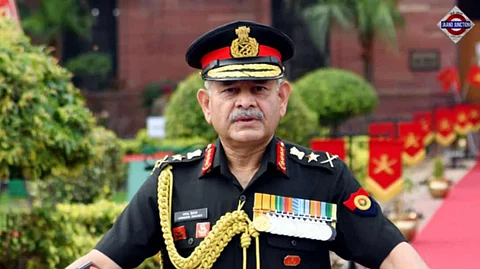

India’s Army Chief, General Upendra Dwivedi has for the first time publicly named Hamas as a terrorist group which is marking a significant change in India’s security and counter-terrorism stance. Speaking at an event this Sunday at IIT-Madras, General Dwivedi included Hamas alongside well-known Pakistan-based terror groups Lashkar-e-Taiba (LeT) and The Resistance Front (TRF). He stated that these groups are a permanent concern for India. This formal acknowledgment is notable because until now, India had avoided officially designating Hamas as a terror organization, despite Western countries like the US, UK and the EU having done so. The United Nations has not designated Hamas as a terrorist group.
Hamas gained global attention after its deadly October 7, 2023, attack on Israeli civilians in Gaza. This triggered a prolonged and devastating war resulting in over 60,000 deaths, including thousands of children. While Hamas historically had no direct role in the Kashmir conflict, India’s security agencies became alarmed earlier this year when Hamas representatives appeared in Pakistan-occupied Kashmir (PoK) on February 5, 2025, during "Kashmir Solidarity Day." Videos and photos showed Hamas members alongside Pakistan-backed militant groups like LeT and Jaish-e-Mohammed (JeM) delivering anti-India speeches vowing to "take Kashmir from India." This showed a new level of cooperation, suggesting that global terror groups may be working with local militants in Kashmir, which is a major concern for New Delhi.
Israel had been urging India to officially designate Hamas as a terrorist group, particularly before the brutal Pahalgam terror attack on April 22, 2025, which killed 26 civilians, mostly tourists. Israeli officials drew parallels between the Pahalgam attack and Hamas’s October 2023 assault, highlighting the cooperation between Hamas and Pakistan-based terror groups. Despite Israel’s push and India’s condemnation of the attacks, New Delhi had so far avoided proscribing Hamas, likely to maintain a diplomatic balance in West Asia, where several countries do not officially label Hamas as a terror outfit.
General Dwivedi’s statement represents a strategic recalibration of India’s threat perception and counter-terrorism policy following Operation Sindoor, which was launched in response to the Pahalgam attack. The operation targeted terror camps in Pakistan and PoK, significantly disrupting terror infrastructure. Now, India appears to be broadening its counter-terror focus beyond its immediate neighborhood to include global jihadist groups that have begun intersecting with the Kashmir conflict.
his shift indicates a preparedness to confront more complex, international terror networks with the potential to impact India’s internal security.
This expanded approach may lead India to monitor and counter groups with international links more closely, reassess its diplomatic posture concerning organizations like Hamas, and enhance intelligence sharing and cooperation with global partners such as Israel. The naming of Hamas as a terror threat alongside LeT and TRF is also a signal that India recognizes the evolving nature of terror threats, now characterized by increasing collaboration among militant groups across regions.
General Upendra Dwivedi’s official recognition of Hamas as a terrorist organization marks a watershed moment in India’s security landscape. It signals India’s commitment to addressing a broader spectrum of terror threats that extend beyond South Asia, acknowledging the interconnectedness of global terror networks with regional conflicts like Kashmir
